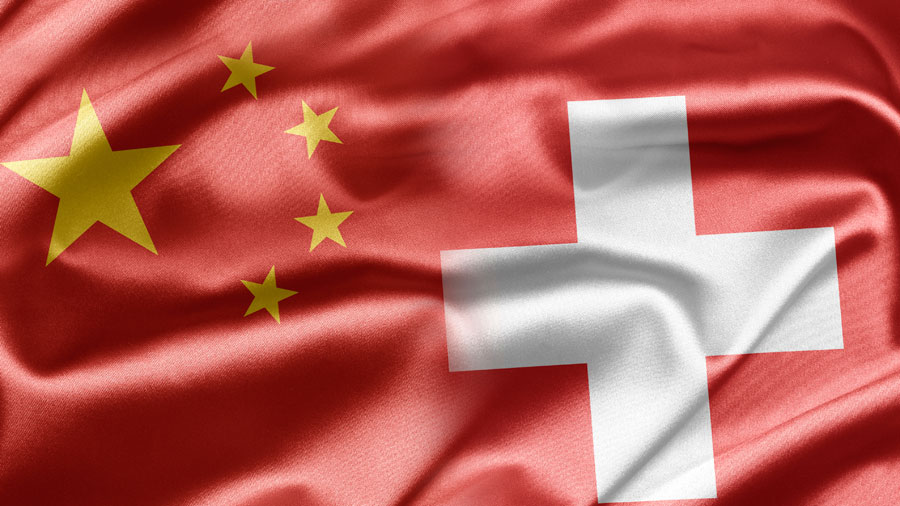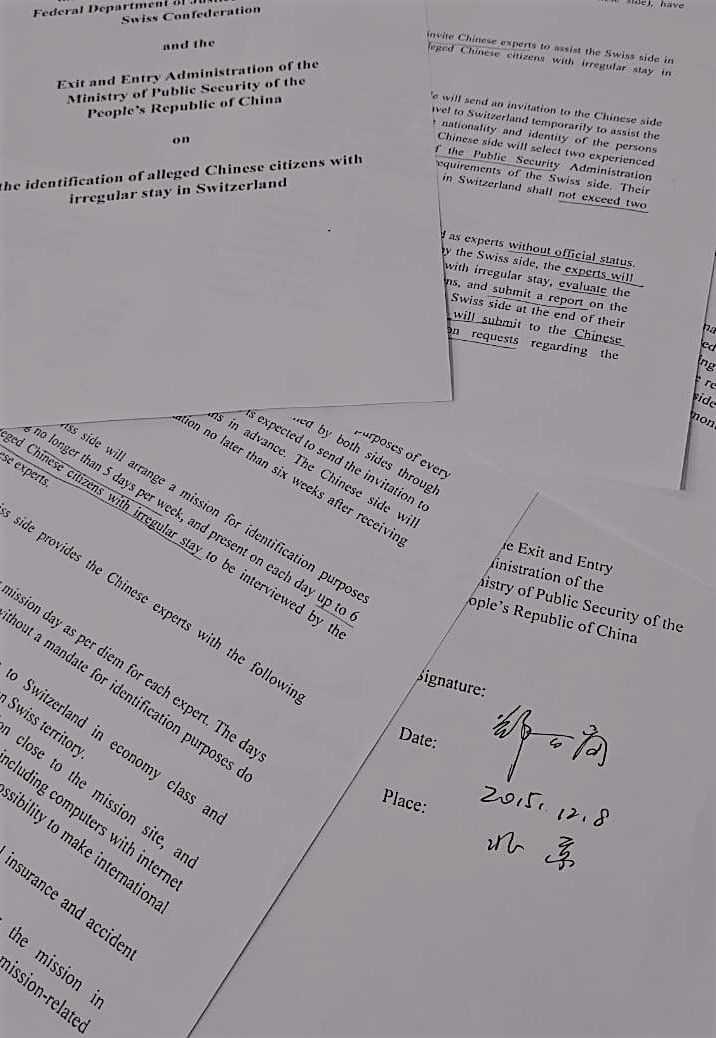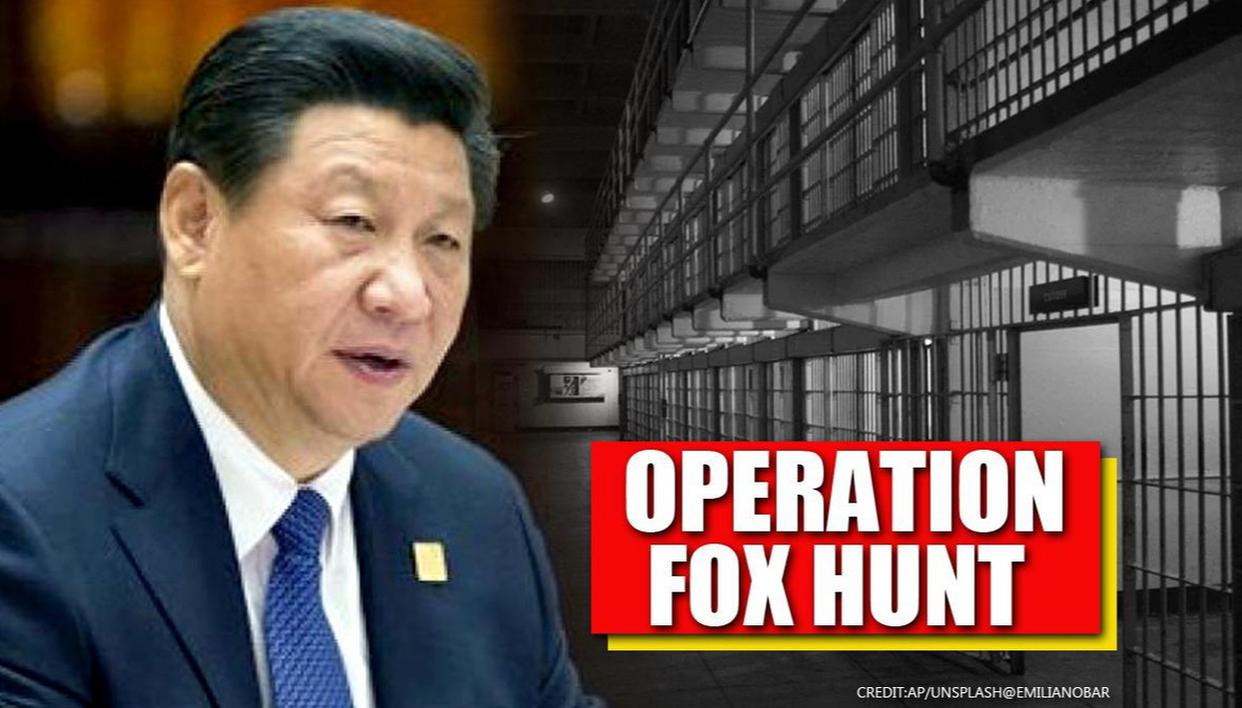Lies and spies - Switzerland’s secret deal with Chinese police
It seems inconceivable that any western European country would give Chinese security and intelligence agents unfettered access inside its borders.
In late August this year, it became clear that Switzerland had done exactly that. In what is usually a standard ‘Readmission Agreement’ – a reciprocal deal between two states on how to return nationals of each other’s’ countries – Switzerland had agreed to allow agents from China’s Ministry of Public Security (MPS) to roam freely – unsupervised - inside the country in a secret agreement that came into effect on 8 December 2015. The deal was so secretive that it wasn’t reported until late summer this year when the Swiss side was starting to seek its renewal, as the original agreement was about to expire.

Image credit: Silk Road Briefing.
Safeguard Defenders have gotten its hands on this agreement, and it is being released here today.
But first, what are readmission agreements? These rather innocuous agreements between States or jurisdictions establishes a channel for two countries to communicate with each other, and requests help. For example, if the Swiss authorities find a person residing in Switzerland illegally, or without the correct papers, and they suspect that person is Swedish, they use a formalized channel to communicate with that country’s immigration or similar department, to get help to determine if this person is indeed Swedish. If they can be sure that they are, they will then cooperate with Sweden to have the person sent back. In return, the other side performs the same duty back. In short, they are reciprocal.
In a few instances, besides having the person sent back, the Swiss side can request that the other party send a representative from their relevant department to accompany this person on the flight back to their home country – although such clauses are only part of some of these agreements.
The agreement with China, which has been kept secret under false pretenses, has little to nothing to do with these regular ‘readmission agreements’, and is of an entirely different character.
The public, just like the Swiss Parliament and the Foreign Affairs Committee, were only alerted to it by a report in the Swiss German-language newspaper NZZ am Sonntag in August. After it went public, the Swiss government, including a cabinet minister, has defended it, including with what has turned out to be misleading statements and falsehoods, shrouding this dubious deal in even greater mystery.
The cover-up
When NZZ am Sonntag broke the story[i] on 23 August, the State Secretariat for Migration (SEM) said it had not been made public because it was an “Administrative Agreement’[ii]. Spokesperson Daniel Bach added that the agreement did not impact Tibetan and Uyghur asylum seekers—they would never be sent back because Switzerland recognized the risk of persecution if they were to do so[iii].
The next day, Cabinet Minister in charge Mario Gattiker appeared before Parliament’s Foreign Affairs Committee and reiterated that the deal was not made public because it was an ‘Administrative’ or ‘Technical’ agreement[iv] . A few days later, Bach claimed the deal was nothing special, saying that Switzerland has such agreements with 60 countries and that two such deals, with China and India, were “technical” so therefore not made public.[v]
Image credit: Nau.ch.
However, the agreement with India was made public. It is shown in full on the Swiss government’s website. In total, the government’s (SEM’s) website[vi] shows 52 agreements (not 60), including with non-State jurisdictions (such as Hong Kong and Macau).
SEM then changed tack and on 12 September said the agreement with China was not published because “it didn’t need to be”[vii].
The explanations from SEM and it minister gets more incoherent when the existence of the agreement, but not the agreement itself, is now listed on the Swiss government’s website under “International treatises” – which must indeed be made public - again countering the idea that its ‘technical’ nature would exclude it from publication.
Analyzing the secret deal
Safeguard Defenders compared the deal with similar agreements between Switzerland and Sweden[viii], the United Kingdom[ix], Hong Kong[x], and India.[xi] As soon as we did so, it was immediately apparent why the Swiss side had wanted to keep it secret.
All the other agreements were concluded with the other party’s immigration department or equivalent. For example, the India deal is with the Foreign Ministry subsection for consular, visa and passport matters.
 In China’s case, it was with China’s Ministry of Public Security (MPS). While the ministry is in charge of immigration, it is also the nation’s police agency, in charge of policing, national security, and with dedicated branches dealing with espionage and counterintelligence. It is also a body implicated in widespread, systematic, and wide-ranging human rights abuses. This point will be key as more specifics about the agreements are revealed further below.
In China’s case, it was with China’s Ministry of Public Security (MPS). While the ministry is in charge of immigration, it is also the nation’s police agency, in charge of policing, national security, and with dedicated branches dealing with espionage and counterintelligence. It is also a body implicated in widespread, systematic, and wide-ranging human rights abuses. This point will be key as more specifics about the agreements are revealed further below.
The majority of the other agreements also have extensive text referencing the limitations of the deal as regards international legal rights protections including the status of refugees and that the agreement does not relate to any cases which could be considered an extradition process. Related paperwork is made public, often even the forms used to request information help about the people whose nationality they are trying to ascertain, and the agreements are reciprocal. In only a minority of cases does the deal allow for the other party to send representatives to accompany the individual to be returned, and in those cases are limited to that specific activity, and is a public, official, duty being carried out.
But in China’s case, the deal was not reciprocal; assistance is only offered to China. Its aim is to expand cooperation against ‘irregular migration’, rather than ‘illegal immigration’ (the more commonly seen term).
The key purpose of the deal is to allow agents of China’s MPS -- an agency accused of crimes against humanity[xii] – free access in Switzerland, for unsupervised operations across the country. Switzerland agreed to keep the identity of visiting agents secret. Agents are selected by China, and Switzerland has no part in the selection. China thus selects any member of the MPS to be sent to Switzerland, and it most certainly aren’t any immigration officers being sent.
Not a single agreement with any other country or region reviewed has this kind of arrangement.
Also, the agents are officially allowed into Switzerland secretly – that is, they do not declare their status or are there in any official capacity. Compare this to the deal with the UK, where all officials allowed into Switzerland as part of any return must be approved by Switzerland and must enter openly in their official capacity.
Secret trips by Chinese agents
MPS agents operate completely freely and unsupervised when they are in Switzerland. They are free to meet with the individual (Chinese nationals whose stays are suspected by Switzerland to be “irregular”) and conduct “interviews”. These Chinese agents are permitted to stay for two weeks; up to six persons can be “evaluated” per day; making a total of 60 people per agent per visit.
Despite having a clause that the data collected may not be shared with other authorities in the respective country except with authorization from the other side – which is usually a long and detailed part of most ‘readmission agreements’ – it is in the agreement with China mentioned briefly, in an article focused almost entirely on the need to keep both the visiting Chinese agents' identity, and their report, secret. As the MPS covers almost every aspect of policing and judicial control in China the clause would, even if expanded, be rather meaningless.
Image credit: Keystone / Mark Schiefebein.
In addition, the agents are given the expressed right to communicate with both the Chinese embassy in Switzerland during their stay and to communicate with the MPS in China, as part of their operation.
At the end of each visit, the Chinese side submits a report. Based on this, Switzerland will work with the Chinese embassy to decide which individuals will be returned to China. The agreement does not stipulate that Switzerland undertake any verification of the information provided by the Chinese agents.
Furthermore, Switzerland bears the total cost of this for the Chinese side. That includes flights, accommodation, per diem costs, communication, office space, and any other operational costs. That is, Swiss taxpayers are paying for Chinese police agents to secretly enter Switzerland and conduct unsupervised operations against Chinese people inside their country.
In 2016, 13 people, including four asylum seekers, were sent back under this agreement. The MPS report on these individuals are not made public, so who they were, what happened to them once they were returned to China, and what steps, if any, the Swiss side took to ensure their safety is also not known.
What China wants
Since Chinese leader Xi Jinping came to power in 2012, one of his signature policies, starting in 2014, has been to pursue Chinese fugitives overseas, including their assets. It has tried to achieve this via extradition requests and expanding extradition treaties with more countries.
According to Party-State media, some 6,000 people had been returned to China by mid-2019 through this initiative, and that report concerns only supposed ‘economic fugitives’ – the real number of returnees is likely much higher than that[xiii]. Just a small fraction of those were through extraditions. The majority have been through what China calls “voluntary returns”. These are often, in fact, involuntary returns, secured either via threats by the MPS against family members back inside mainland China or by roving agents of either the MPS or the Ministry of State Security (MSS).

Image credit: Associated Press.
In late October this year, the United States Justice Department released an indictment[xiv] against eight people acting illegally as agents for China to “convince” Chinese nationals living in the United States to return to China – including “stalking its victims”.
“The defendants, allegedly acting at the direction and under the control of PRC government officials, conducted surveillance of and engaged in a campaign to harass, stalk, and coerce certain residents of the United States to return to the PRC as part of a global, concerted, and extra-legal repatriation effort known as “Operation Fox Hunt.”” – the U.S. indictment.
Earlier, there has been significant media coverage of agents of the MSS traveling, secretly, to the United States, to do the same against high profile exiled Chinese businessman Guo Wengui (a.k.a Miles Kwok), and despite these agents being allowed to return to China, the FBI confiscated their cell phones before being allowed to leave.

Image credit: ABC.
Safeguard Defenders has been contacted on multiple occasions by Chinese nationals abroad worried about Chinese agents trying to coerce them into going back or to try to help them coerce others. In all occasions, such coercion involved threats to their families back home in China. Well-known exiled artist Badiucao detailed his own experience with this, once the then anonymous artist’s identity had been secured by the MPS, who started moving against him[xv]. In its 7 August 2020 Report to the Human Rights Council, the specialist UN body on enforced disappearances (WGEID) expresses alarm at China's use of "extraterritorial abductions and forced returns" and noted that it has identified some "300 Uighurs [alone] have been forcibly returned to China from 16 different countries".
Despite being little studied as a practice itself, or as a larger and coordinated campaign, there are numerous media reports from around the world on individual victims being targeted as part of the involuntary returns campaign, and Safeguard Defenders is launching a research project on this issue and which is set for release mid-2021.
 Switzerland is here standing in sharp contrast to the US that prevents such agents access and pursues such illegal activities, and Sweden which is working to expose and prevent Chinese refugee espionage and prevent it across Northern Europe, and taking a lead in blocking extraditions to China based on the European Convention on Human Rights (ECHR).
Switzerland is here standing in sharp contrast to the US that prevents such agents access and pursues such illegal activities, and Sweden which is working to expose and prevent Chinese refugee espionage and prevent it across Northern Europe, and taking a lead in blocking extraditions to China based on the European Convention on Human Rights (ECHR).
While victims around the globe are being threatened to forcibly return to China, or when they refuse, having their families bear the punishment back home, Switzerland has all along been actively helping Chinese police in extending its reach inside Switzerland, and which serves the identical purpose, to have returned to China those the Chinese government wants to be returned. It is now, still hiding behind secrecy, seeking to renew a deal that would assist in that very practice.
In addition, by having the Swiss side agree to make these visiting delegations of selected MPS agents unofficial, we can only assume - unless an additional secret agreement exists - that they are given regular tourist visas, which would give those agents free access to the entire Schengen area. As such, within the timeframe of the two-week visit period, intelligence agents from the MPS are, theoretically, given direct access, undercover, to almost all of the European Union, and as no border controls exist, and these visits are not supervised by the Swiss side, poses a very significant security risk.
Will the deal be renewed?
The deal expired 7 December 2020. Happily, resistance against its renewal is growing, as reported by NZZ am Sonntag. A now arrested Hong Kong pro-democracy protest organizer, Joshua Wong, has pointed out it could be used against dissidents[xvi]. Switzerland’s Foreign Affairs Committee on October 20 voted 14 against 7 to request a consultation on any new similar agreement[xvii], debate for which is scheduled for spring 2021[xviii]. Any vote or decision that would come out of a consultation, however, would not be legally binding, and the Swiss government would be free to renew the deal.
The problem with this deal is not just (1) the secrecy surrounding it; (2) the effort by officials to mask its true nature once it was exposed; (3) the fact that Chinese agents are given the right to operate freely in Switzerland with no oversight; and (4) that there is no way to ensure these agents do not enter or operate in other parts of the EU due to visa-free travel, but that this done whilst it is known that such agents use threats against their targets, or their family members back in China, to get individuals to agree to return.
As for the reporting submitted by these agents to the SEM, which stands as the basis for recommending people to send back, against their will, Nadia Boehlen, spokesperson for Amnesty International, said “On this point, the response of SEM is not sufficient. It seems no risk analysis has been done and nor is any monitoring in the country of origin being done.”[xix]
On the other side of the moral spectrum, MP Hans-Peter Portmann, from the Liberal Party (FDP), said "There is no reason to have a different practice with China than with countries with which we are also in an ongoing dialogue on human rights issues"[xx]. Right-wing national conservative party Swiss People's Party (SVP) told Safeguard Defenders on December 3 via email “It is above all left-wing circles who oppose this agreement with China. Such deportations are of course in the interest of the SVP.”
However, Nick Gugger, an MP with the Evangelical People's Party (EVP) perhaps summed it up best when saying “Switzerland is top at doing business. But unfortunately also world champion in looking away."[xxi]
The agreement
Download (English) as PDF here:
[i] https://www.swissinfo.ch/eng/politics/swiss-explore-renewal-of--secret-deal--with-china/45985878
[iii] https://www.swissinfo.ch/eng/politics/swiss-explore-renewal-of--secret-deal--with-china/45985878
[vi] https://www.sem.admin.ch/sem/en/home/internationales/internat-zusarbeit/bilateral/rueckuebernahme.html
[xii] https://safeguarddefenders.com/en/blog/rampant-repression-30000-disappeared-china-s-rsdl-jails-2013